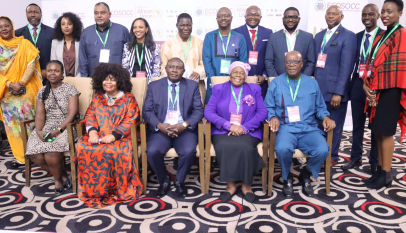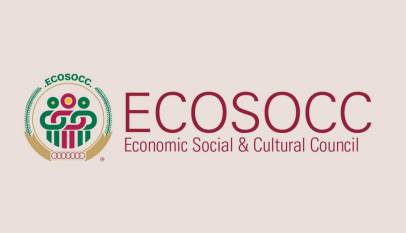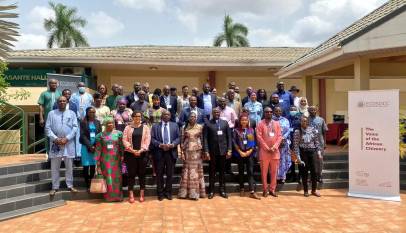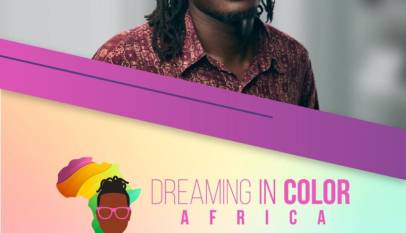AU ECOSOCC, AfDB push for a gender-sensitive response to COVID-19 in Africa
In support of Africa’s response to the COVID-19 pandemic, the African Union Economic, Social and Cultural Council (AU ECOSOCC) and the African Development Bank (AfDB)’s Gender, Women and Civil Society Department, are jointly hosting a series of weekly thematic webinars aimed at raising awareness and sensitizing African citizens about the pandemic.
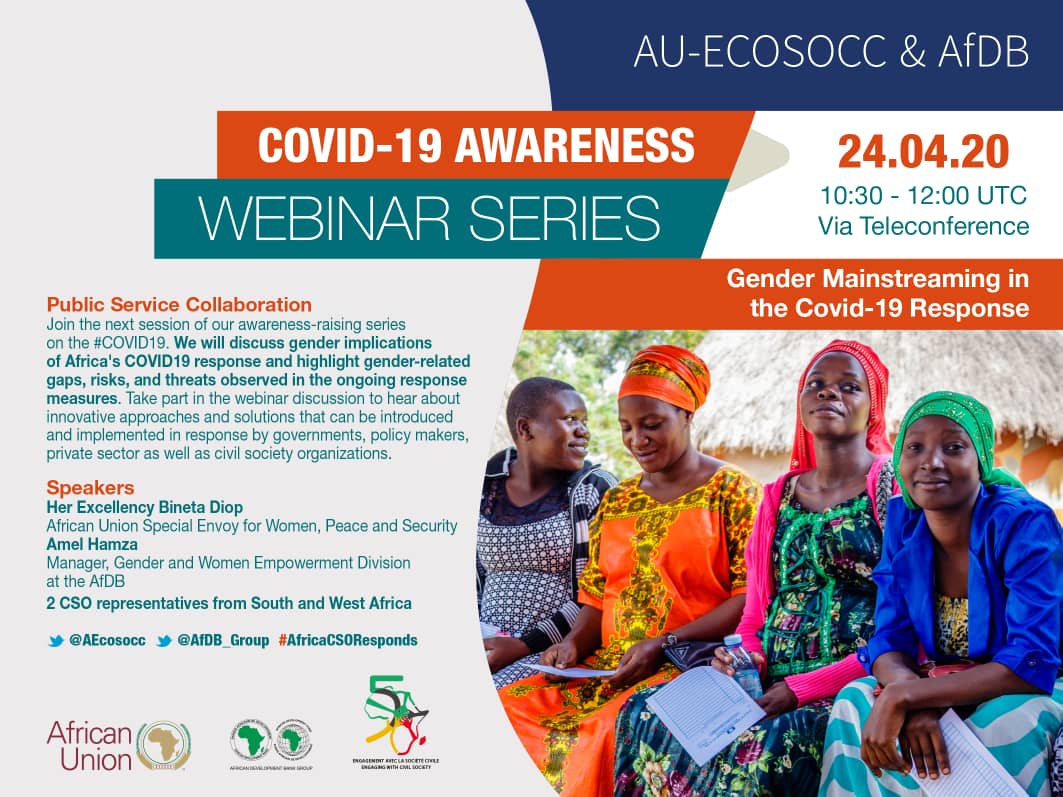
The fallout of the crisis induced by the COVID-19 pandemic continues to reshape the day-to-day engagements of people all over the world; disrupting human economic activities across countries of the world. The shutting down of human activities necessary for the functioning of economies as a result of lockdown measures by governments such as movement restrictions, social distancing, and work-at-home policies is not without consequences on social interactions.
Although the pandemic has damaging effects on both men and women, the patterns and proportion of these effects varies across both genders i.e COVID-19 is not gender-neutral which calls for gender-specific response to the crisis. For example, whereas regular economic recessions are known to have more negative effects on men, pandemic-driven recessions such as the COVID-19 global economic recession tend to affect women more disproportionately than it does their male counterparts.
Beyond its economic implications for the female gender, the pandemic exposes African women and girls to various vulnerabilities namely, domestic violence, sexual violence, amongst others. However, despite the unequal effect of the COVID-19 crisis on women and girls, individual African governments’ response to the pandemic had been largely gender-insensitive hence the urgent need for gender mainstreaming in the continent’s response efforts against the ravaging pandemic.
In a bid to highlight gender-related gaps, risks, and threats in the ongoing response efforts against COVID-19 in Africa, and as part of their support to the continent’s response to the pandemic, the African Union Economic, Social and Cultural Council (AU ECOSOCC) and the AfDB’s Gender, Women and Civil Society Department, recently hosted African citizens and civil society actors from across the continent to a webinar discussion, themed: “Gender Mainstreaming in the COVID-19 Response.” The webinar was part of a series of weekly interactive sessions meant to raise awareness and sensitize African citizens and civil society about the COVID-19 pandemic.
The ECOSOCC-AfDB webinar series serve as a platform for the sharing of lessons from the interventions of African civil society organisations (CSOs) at national and subnational levels, in response to the pandemic, albeit under difficult circumstances. This is to help government policymakers and actors in the private sector as well as fellow CSOs across the continent draw lessons from innovative technologies and impactful best practices that need to be replicated, to save more lives and build community resilience against the disease in Africa.
While addressing participants at the webinar, Her Excellency Bineta Diop, African Union Special Envoy for Women, Peace and Security, decried the fact that the COVID19 response in Africa had fallen short of gender considerations adding that gender ought to have been part and parcel of the preparedness and response plan for COVID-19 – and not be an afterthought! Diop, therefore, sued for gender-integrated responses to the pandemic as well as a platform for knowledge sharing and monitoring of the implementation of gender equality policies in Africa so as to hold governments accountable for their gender policies.
“One of the key issues that has become evident is domestic violence. Homes have to be safe spaces for women and children. Men have to protect their families. From the reports we are receiving, there is an increase in gender-based violence. While we are talking, Boko Haram is still fighting and it is impacting on the women in those camps in northern Nigeria, Lake Chad, and the Sahel region; women are doubly suffering,” the Envoy said.
Diop noted that whereas Africa was not short of policies regarding gender equality and women empowerment, the continent had been falling short of implementing such policies including the landmark United Nations Security Council Resolution 1325 (UNSCR 1325), which seeks to prevent violations of women’s rights during conflicts and support their participation in peace negotiations, post-conflict reconstruction as well as protect women and girls from wartime sexual violence.
“2020 marks the 20th anniversary of Resolution 1325; my office is leading Africa’s effort on the implementation of the Women, Peace and Security (WPS) agenda with regards to 1325; Gender-Based Violence (GBV) within the context of conflicts is part of the WPS agenda. So far, 26 or 27 AU Member States have adopted their National Action Plans (NAPs) with regards to Resolution 1325. The Regional Economic Communities (RECs) have also developed regional action plans on WPS. A WPS agenda is not only meant for countries in war situations; emerging humanitarian challenges such as COVID-19 and climate change call for such an agenda,” she noted.
Ms Victoria Maloka, acting director of the Women, Gender and Development Directorate (WGDD) at the AU Commission, while sharing with participants the AU’s draft guidelines for gender-responsive interventions to COVID-19 in Africa, said women and girls would invariably be disproportionately affected by crises and emergency situations such as the COVID-19 pandemic.
Consequently, Ms Maloka said there was need for investment in women leadership by ensuring women were part of African countries’ mechanisms to prevent, mitigate and contain the pandemic. She therefore urged African governments to ensure women and girls were at the centre of all emergency preparedness and response plans, at all times. “It is really key that we highlight the significance of gender-perspectives in the responses.”
The top AU gender officer decried what she identified as the “scarcity of data” on the effect of COVID-19 on women and girls in Africa adding that the AU’s guidelines encourage RECs and Member States (MS) to collect gender-disaggregated data, based on sensitive gender analysis of the differentiated impact of COVID-19 on women and men across Member States and RECs.
“Our guidelines request for special budgetary allocations from the AU COVID-19 Fund and solidarity fund for rapid response against GBV. We are also mobilizing resources from our partners to directly address GBV across Member States; we encourage the MS to utilise the funds in implementing innovative and impactful strategies to protect women and girls against GBV. We also request for the establishment or strengthening of existing emergency centers or safe houses for survivors of GBV. Moreover, we are requesting the MS to intensify psychosocial support for GBV survivors and ensure the speedy prosecution of the perpetrators,” she urged.
Ms Amel Hamza, manager for gender and women empowerment at AfDB, was one of the speakers at the AU ECOSOCC-AfDB webinar, who said Africa needed a strong mechanism for responding to the COVID-19 crisis, from a gender-perspective. Ms Hamza said AfDB was working with its member countries from across the continent to support the most vulnerable women, urging African countries to provide social protection grants to women working in the informal sectors of their economies.
“The question is do the governments have strong and implementable policies on social protection and social safety nets? If there are strong policies then the grant AfDB is providing to African governments will reach the most vulnerable groups. If we don’t have solid policies, this is the time for the MS to work with AU to develop such policies. We believe our support will help the most vulnerable women in society and help achieve gender integration,” said Hamza.
While narrating her experience dealing with victims of GBV in Cote d’Ivoire during the COVID-19 pandemic, Simone Assa-Akoh of the Association of Women Jurists of Côte d’Ivoire, said they had received several cases bordering on domestic violence and child rape. She however decried the lack of safe houses or support centers to host victims of GBV in Côte d’Ivoire which she said compelled victims to stay in the very homes where the violence was committed against them, disrupting legal action against the perpetrators.
“We need victims’ support systems to manage cases of victimized women and girls victims. Lack of victims’ support systems is a major weakness which continues to expose victims to pressures from their families and households. This disrupts the cases especially when it comes to legal action. I refer to our first case where the lady had to withdraw her case because she was under pressure from her family. I would say that I commend institutions that make sure that gender is in their responses,” said Assa-Akoh.
Participants at the webinar on gender-integration in African countries’ response to COVID-19 unanimously agreed to continue to push for the implementation of the various global and continental policies on gender equality. Such gender-related policies that featured during the discussion were the UNSCR 1325; the Protocol to the African Charter on Human and Peoples’ Rights on the Rights of Women in Africa (Maputo Protocol) as well as the Solemn Declaration on Gender Equality in Africa. Subsequently, they called for a high-level continental platform of African women leaders in government and civil society to push for Africa’s WPS agenda.


